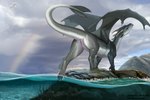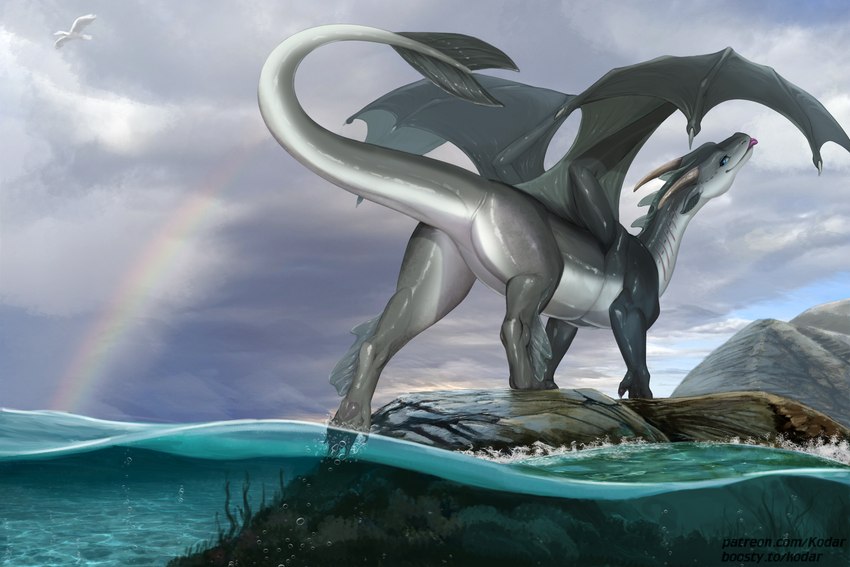
Description
The Sea Dragons tribe predominantly inhabits the southern seas, which are warm and rich in food. These dragons can be found throughout the saltwater regions, as well as in the largest of lakes. They are, perhaps, the most numerous tribe overall, with numerous sub-species in existence. Sea dragons display a wide array of colors, including grey, white, black, blue, and green. Some Sea Dragons have fin ribbons that run along their body, and they possess webbed feet and a large fin on their tail. The fin ribbons serve primarily as decoration and can even be shed if a Sea Dragon is forced to live above water for too long, after which they will regrow. Sea Dragons have sleek, rubbery skin that may be adorned with bio-luminescent dots, and their fins may also possess luminescent qualities. The deep-sea sub-species can even communicate using their bio-luminescent abilities underwater.
All sea dragons possess both gills and regular dragon lungs, enabling them to breathe both underwater and in the air. However, it is better for them to alternate between land and sea. If they are forced to remain outside of the water for an extended period, they may experience pain in their gills, inflammation, or even more severe health issues. Conversely, if they fail to breathe air periodically, their lungs may fill with mucus, necessitating an uncomfortable and effortful process to clean and reactivate them. Moreover, while they may only experience a slight lack of air while underwater, sea dragons always relish the opportunity to fill their lungs with fresh oceanic air.
Sea dragons are typically carefree and playful. They often form friendships with cetaceans, particularly those of higher intelligence, and can even learn to communicate with them. The majority of sea dragons live a nomadic lifestyle, migrating thousands of kilometers in any direction they please. However, there are also underwater settlements and even overland cities where they craft items and engage in trade with other tribes.
The ocean is a realm of wonders. There are the ancient sunken ruins of the Elder civilization, the stunning Coral City, where half of the metropolis is submerged underwater and the other half floats above the surface. There is Beryl Port, where sea dragons provide transportation services of various kinds over the seas, from ships to the unique experience of riding whales. The Great Waterfall is a zone of gravitational anomaly, where an immense mass of water is drawn out of the sea, moves upwards in a circular motion, and then falls back down in a spectacular display. And then there is the Green Bridge, a colossal natural structure that consists of unique levitating plants. These plants start growing deep beneath the water's surface, before extending upwards and entwining to connect the floating islands above, eventually reaching the lands of the sky dragons. The Green Bridge is capable of supporting the weight of any dragon and is used for casual walking or to reach the higher levels for flightless species.
Most sea dragons simply enjoy their lives and do not concern themselves with worries. However, there are some uneasy regions within their watery domain. The Rift has crossed the sea bed, creating the Black Chasm. This sinister chasm is a source of evil, inhabited by dark creatures that dwell in its bottomless depths and occasionally rise to the surface. Native sea creatures living nearby the Black Chasm grow aggressive and deformed. A large number of Sea Sentinels keep a watchful eye on the Black Chasm with the help of loyal cetaceans. They warn each other of any new threats and fend them off when possible. With each passing year, the Black Chasm continues to spread further and grow wider, which greatly concerns the elders. Over a decade ago, a new threat emerged - the black sludge. This gooey substance seeps from the chasm and accumulates in large pools on the sea bed. Entire regions of the sea have been overtaken by this black gunk, depriving them of regular sea life; no fish schools swim there, and no seaweed grows. The black sludge may even form "tentacles" that squirm around or stick upwards like creepy sea stalks, seemingly having a life of their own, and attempting to catch and hold onto unsuspecting creatures.
Some of the noteworthy sub-species of sea dragons include the Abyssal tribe, which as the name suggests, inhabits the deepest waters. These dragons look a lot like their more common sea cousins but are wingless and have longer tails with more developed fins. Abyssal dragons are the only sea species that can live their entire lives underwater and never breathe air. They also have bigger eyes adapted to seeing in the dark waters of the deep. The Abyssal tribe rarely shows up on the surface or even at the higher layers of the sea due to obvious health reasons. They are masters of bio-luminescent communication, having developed a whole language to communicate with each other via light signals, which other species have adopted to varying degrees.
Previously, the Abyssal tribe was probably the most mysterious and elusive dragon tribe, living their lives in places no one could reach. But recently, something has stirred them, and they have started migrating to the upper levels of the sea in large numbers. These dragons look like refugees, emaciated and sickly, with many bearing injuries. It appears that the Abyssal tribe has lost the ability to speak the common verbal language of the dragons, and their lumi-speak has become too complicated for other sea dragons to fully understand. They tell of an unbeatable ancient foe's return, something like the planet itself is the foe, which makes no sense. A series of shelters in underwater caverns have been established for the refugees, and a number of volunteers from the upper seas are helping them. The full story of what's happening below remains to be unveiled as the understanding of the Abyssal dialect improves.
• Artwork is only possible because of your support ♥ https://www.patreon.com/Kodar :: https://boosty.to/kodar •
 furaffinity.net/view/51198745/
furaffinity.net/view/51198745/
There are no comments.
Login to respond »